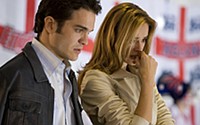 aka: Taking on the World
aka: Taking on the World
scr Mike Jefferies, Piers Ashworth
with JJ Feild, Leo Gregory, Kuno Becker, Nick Moran, Kasia Smutniak, Anya Lahiri, Tamer Hassan, Gary Lewis, Christopher Fairbank, Craig Heaney, Margo Stilley, Tereza Srbova
release 15.Jun.09 dvd
09/UK 1h32

This isn't going well: Becker and Smutniak



See also:


 The conclusion of the officially sanctioned Fifa trilogy oddly shifts the attention away from the central character Santi to focus on two English players instead. The result is watchable and lively, but still a bit corny.
The conclusion of the officially sanctioned Fifa trilogy oddly shifts the attention away from the central character Santi to focus on two English players instead. The result is watchable and lively, but still a bit corny.
As the 2006 World Cup approaches, three players prepare to join their national teams. Santi (Becker) will play for Mexico, while Liam and Charlie (Feild and Gregory) are English. But first they head to Romania, where Charlie has a role in a schlocky horror film and a car-crash injury puts an end to one of their World Cup dreams. Then one finds love with a sexy actress (Smutniak), while another descends into alcoholism when he discovers that he has a daughter with an ex (Lahiri). Will any of them make it to the World Cup?
The over-structured plot makes it clear from the start that these three guys are going to visit the full range of life-or-death crises a professional sportsman can face, and as the story progresses the misery they must endure starts to get a little ridiculous. After the first two films, which examined Santi's rise from poverty to the peak of professional footballing, why did the filmmakers decide to end on such a downer? And why did they essentially abandon Santi for this film?
It's not as if Liam and Charlie aren't strong characters with good stories of their own, but this is the concluding part of a trilogy, so they should really have been supporting roles in Santi's story. And this shift of balance to a more generic perspective really undermines the film. Without a specific point of view, it has a more omniscient soap opera feel to it, and also has an almost cautionary tone as it examines the dangers that lurk in the big bad world.
With some focus and a bit of depth this could have worked, but the script sprints through the story. There's no subtext at all, but rather a lot of obvious foreshadowing, not to mention lots of clunky dramatic dialog that never manages to get beneath the surface at all. The low point is when one character has to tell us a major plot point while giving a teary eulogy at a funeral.
That said, the cast manages to make the most of their characters. Feild and Gregory are lively and charming on screen, with a great sense of chemistry that gives the film a bit of a kick, as it were. And they never give into the overdramatic plot or indulge in the cheesy laddishness that the filmmakers seem intent on putting on-screen (including scantily clad women in every scene for no other reason). Despite a background in music videos, director Morahan doesn't bring much visual style to the film, and also unlike the first two films, the real footballers never interact with the cast either on or off the pitch (the match scenes are very dodgy). And in the end, it feels more like a public service announcement for 15-year-old boys than an actual movie.
 |
themes, language, innuendo, drugs | 4.Jun.09 |

 Still waiting for your comments ... don't be shy.
Still waiting for your comments ... don't be shy.
HOME | REVIEWS | NEWS | FESTIVAL | AWARDS | Q&A | ABOUT | TALKBACK